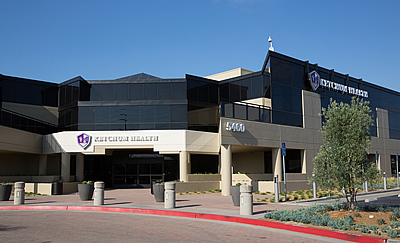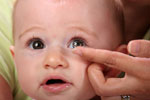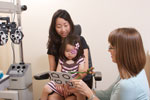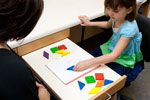Residency Programs
Residency in Pediatric Optometry, Vision Therapy and Vision Rehabilitation
University Eye Center at Ketchum Health

Established: 1978
Positions: Two
University Eye Center (UEC) at Ketchum Health
Southern California College of Optometry at Marshall B. Ketchum University
5460 E. La Palma Ave.
Anaheim, CA 92807
PROGRAM FACULTY
Residency Coordinator: Angela Chen, OD, MS, FAAO*
Attending Faculty Members
- C. Troy Allred, OD
- Surbhi Bansal, OD, FAAO, FOVDR
- Natalie Breau, OD, FAAO
- Steven Chang, OD, FAAO
- Susan Cotter, OD, MS, FAAO*, FOVDR
- Silvia Han, OD, FAAO, FOVDR
- Kristine Huang, OD, MPH, FAAO
- Rachelle Lin, OD, MS, FAAO
- Eunice Myung Lee, OD, FAAO
- Reena Patel, OD, FAAO
- Jillian Youngerman, OD, FOVDR
*Diplomate, Binocular Vision, Perception & Pediatric Optometry Section of American Academy of Optometry
 |
 |
 |
 |
MISSION STATEMENT
The mission of the Pediatric Optometry, Vision Therapy and Vision Rehabilitation (POVT) Residency is to develop resident’s clinical expertise through advanced training and diverse clinical experiences in the diagnosis and management of pediatric eye conditions, binocular vision anomalies, and visual information processing disorders.
PROGRAM DESCRIPTION
The POVT Residency is based at the University Eye Center at Ketchum Health, a fully-equipped patient care facility owned and operated by the Southern California College of Optometry at Marshall B. Ketchum University (SCCO at MBKU). The residency is a full-time, formal, supervised program combining patient care, didactic education, teaching experience, and scholarly activities.
PROGRAM GOALS & OBJECTIVES
Goal 1: To enhance resident’s knowledge and clinical expertise in evaluating, diagnosing, and managing children of all ages in a primary care setting.
Objectives:
Resident will:
1. Provide at least 150 primary care eye examinations for children of all ages, including infants and toddlers.
2. Examine, diagnose, and develop management plans for children with a range of visual conditions, including significant refractive errors, binocular vision anomalies, and pediatric ocular diseases.
Goal 2: To enhance resident’s knowledge and clinical expertise in evaluating, diagnosing, and managing binocular vision and visual information processing disorders.
Objectives:
Resident will:
1. Demonstrate enhanced skills in performing and interpreting tests used to evaluate and manage ocular motility, accommodation, non-strabismic and strabismic binocular vision disorders, amblyopia, and visual information processing disorders.
2. Complete at least 100 patient encounters evaluating and/or managing patients with ocular motility, accommodative, and/or non-strabismic binocular vision disorders.
3. Complete at least 100 patient encounters evaluating and/or managing patients with strabismus and/or amblyopia.
4. Complete at least 75 patient encounters evaluating and/or managing patients with visual information processing disorders.
Goal 3: To enhance the resident’s knowledge and clinical expertise in evaluating, diagnosing, and managing patients with intellectual and developmental disabilities, acquired brain injury, childhood visual impairment, or visual conditions requiring specialty contact lens fitting.
Objectives:
Resident will:
1. Provide comprehensive eye care for patients with intellectual and developmental disabilities, including Down syndrome, autism, and cerebral palsy.
2. Provide comprehensive vision services, including vision rehabilitation when appropriate, for patients with acquired brain injury.
3. Rotate through specialty clinics (e.g., Beyond Blindness and Disability & Accessibility Clinic) to develop the knowledge and skills necessary to diagnose, treat, and manage children with visual impairments.
4. Examine and perform contact lens fittings for children who require specialty contact lenses.
Goal 4: To enhance resident’s communication skills with other professionals for well-coordinated patient care.
Objectives:
Resident will:
1. Complete a clinical rotation with pediatric ophthalmologists.
2. Complete a clinical rotation that includes interactions with other professionals, such as early interventionists, teachers for the visually impaired, and allied health professionals who commonly work with children with developmental disabilities and/or childhood low vision.
3. Have the opportunity to interact with school district personnel and participate in Individualized Education Plan (IEP) meetings.
4. Develop the ability to communicate effectively in writing with referring optometrists, other health care providers, and professionals outside the health care field.
Goal 5: To cultivate resident’s engagement in scholarly activities, including clinical research, optometric education, life-long learning, and dissemination of knowledge.
Objectives:
Resident will:
1. Engage in scholarly activities with 4 hours provided per week.
2. Participate in the monthly Pediatrics and Vision Therapy Department Journal Club and present at a minimum of 8 meetings.
3. Give at least 1 oral presentation (e.g., SCCO Residency Forum) to optometry students or optometrists.
4. Attend scientific meetings and submit an abstract for presentation.
5. Write a case report of publishable quality, focused on the diagnosis and management of disorders related to pediatric vision, binocular vision, or visual information processing.
6. Expand their expertise by actively engaging in activities that support the pursuit of professional fellowships in the American Academy of Optometry (FAAO) and the Optometric Vision Development & Rehabilitation Association (FOVDR).
7. Have the option to participate in ongoing clinical research or to conduct an independent research project.
8. Have opportunity to teach in laboratories that pertain to strabismus, vision therapy, and visual information processing to develop their academic-based teaching skills.
9. Supervise optometry students in pediatric vision and vision therapy services to develop their clinical teaching skills.
RESIDENCY SCHEDULE
The length of the program is 12 months and 1 week. Resident begins during the last full week of June, allowing for a one-week overlap with the outgoing residents to facilitate the transfer of patient care. The residency ends on June 30th of the following year.
Residents receive a 40-hour weekly schedule issued quarterly in alignment with the College’s academic calendar. The schedule includes direct patient care assignments, on-site specialty care clinical rotations, laboratory teaching, course auditing, and external rotations. It also allocates time for weekly faculty consultations and scholarly activities.
On-site specialty clinical assignments include:
- Acquired Brain Injury: 2 hours per week for 12 months
- Disability & Accessibility Clinic: 3.5 hours per week for 12 months
- Pediatric Contact Lens: 4 hours per week for 6 months
External rotation assignments include:
- Beyond Blindness: 3.5 hours per week for 6 months
- Pediatric Ophthalmology Observation: daily for 2 weeks
- University Eye Center at Los Angeles: 8 hours per week for 1.5-2 months
Depending on the quarter, the resident's schedule may resemble the following:

RESIDENCY ACTIVITIES
Clinical Activities:
- Residents will provide direct patient care under the supervision of expert faculty. Residents will:
- Provide primary vision care for infants and children, including wellness exams and specialized care for those who are at risk, visually impaired, or have developmental and intellectual disabilities.
- Evaluate patients with ocular motility, accommodative, and binocular vision disorders (strabismic and non-strabismic), as well as amblyopia, and provide appropriate management, including passive therapy (e.g., lenses, prisms, occlusion, referrals when indicated) and active vision therapy.
- Evaluate and manage patients with visual information processing deficits, including making appropriate multidisciplinary referrals when indicated.
- Evaluate and fit medically necessary specialty contact lenses for pediatric patients.
- Provide pediatric low vision services for children with visual impairment.
- Provide comprehensive vision services for patients who have acquired brain injury.
- Provide myopia management services with various treatment modalities including atropine, orthokeratology, and soft multifocal contact lenses.
- Residents will complete a clinical rotation with pediatric ophthalmologists to gain insight into ophthalmological perspectives on managing binocular vision anomalies and pediatric eye diseases.
- Residents will co-manage patients with professionals from other disciplines, gaining experience in the logistics of multidisciplinary care and the importance of interprofessional communication.
- Residents will precept students for one clinic session (half day) for a minimum of two quarters. Additional precepting assignments can be arranged, depending on the residents’ interests.
- Residents will have 1 week per month of “on-call” duty in the University Eye Center Emergency Service.
Didactic Activities:
- The program includes weekly consultation meetings with the POVT Residency faculty, in the following content areas:
- Pediatric primary care diagnosis, treatment strategies, and management
- Binocular vision diagnosis, treatment strategies, and management
- Visual and developmental milestones in infancy and early childhood
- Common developmental anomalies in infants and children
- Visual information processing diagnosis, treatment strategies, and management
- Residents have access to additional faculty with expertise in specialty areas such as contact lenses, ocular disease, and low vision.
- Residents will attend courses 771: Vision, Perception and Learning, 772: Strabismus/Amblyopia Diagnosis, and 773: Strabismus/Amblyopia Management.
- Residents will assist the assigned faculty as a laboratory instructor in Courses 771: Vision, Perception and Learning and 772: Strabismus/ Amblyopia Diagnosis. Co-teaching as a laboratory instructor in course 672: Management of Non-Strabismic Binocular Vision Conditions is optional.
- Residents will attend faculty-led seminars on Special Education, Sports Vision, Acquired Brain Injury, and Disability & Accessibility. Additionally, residents will participate in discussions on topics such as myopia management, genetic testing, and aniseikonia management.
- Residents will have the opportunity to tutor students for courses within the binocular vision curriculum.
Scholarly Activities:
- Residents and faculty meet monthly for Journal Club, where scholarly articles are presented and discussed. Each resident is assigned to present one article per session, with a minimum of 8 presentations required.
- Beyond Journal Club assignments, faculty mentors assign supplementary readings to enhance the residents’ ability to provide evidence-based patient care.
- Residents are encouraged to attend scientific meetings (e.g., AAO, OVDRA), local education meetings, and continued education held at the College.
- Residents are encouraged to submit and present scientific abstracts at the AAO and/or OVDRA meetings.
- Residents will write a clinical case report, suitable for submission to a peer-reviewed professional journal.
- Residents will present at the SCCO Residency Forum. Additional presentation opportunities include case presentation in a course within the BV curriculum and CE held at SCCO or society meetings.
- Residents are encouraged to participate in clinical research projects (e.g., associate investigator in the Pediatric Eye Disease Investigator Group Network, independent research study).
STIPEND & BENEFITS
The residents will receive an annual stipend of $68,640 (not contingent upon productivity). No tuition or application fees are paid by the residents to the University.
| Medical Insurance | Residents will be offered medical insurance in compliance with the Affordable Care Act (ACA). Eligibility criteria, available plan options, and associated rates will be detailed by Human Resources during the new hire orientation. |
| Sick Leave | In accordance with California labor law, residents will receive 40 hours of paid sick leave at the commencement of the contract year. The leave is available for use starting on the first day of the contract and must be utilized in half-day (4-hour) increments. |
| Jury Duty and Bereavement Leave | Residents are entitled to leave for jury duty and bereavement, consistent with the university policy. |
| Educational Travel | Reimbursement of up to $1000 and 5 professional days for approved educational meeting(s) will be provided. |
| Liability Insurance Coverage | Professional liability insurance will be provided by the University for patient care activities at Ketchum Health and Beyond Blindness. |
| Dr. Michael Rouse Endowment | Dr. Michael Rouse Endowment provides monetary support for the purchase of equipment, books, or other items for residency or educational needs. |
COMPLETION REQUIREMENTS
- The resident is required to deliver patient care by diagnosing and managing a diverse range of eye and vision disorders at a level satisfactory to those responsible for the supervision of the resident, while demonstrating a caring, compassionate, and ethical concern for the welfare of their patients.
- The resident is expected to conduct themselves professionally, provide high-quality patient care, and adhere to the standards of conduct courtesy consistent with the policies and regulations of the College.
- The resident is required to complete mandatory scholarly activities.
- The resident is required to keep and submit quarterly and end of year logs including patient encounters and diagnoses, residency faculty evaluations, residency program evaluation, referral log, activity log, reading log and rendered services.
- The resident must turn in their ID access badges and all library materials, and settle any outstanding accounts with the Campus Store.
Upon satisfactory completion of all program requirements, the resident will be awarded a Certificate of Completion by SCCO.
APPLICATION PREREQUISITES & REQUIREMENTS
- Attainment of a Doctor of Optometry (O.D.) degree from a school or college of optometry accredited by Accreditation Council on Optometric Education
- Successful completion of the National Board of Examiners in Optometry (NBEO) Part I and II (including the TMOD exam)
- Completion of NBEO Part III is preferred, but not always possible due to timing when scores are released
- Passing the California State Board of Optometry Law Exam before starting the residency program
- Complete the POVT residency application made through the ORMatch by January 10 deadline:
- Curriculum vitae
- Letter of intent stating reasons for pursuing residency training, in general, and this program, in particular; expectations from residency experience; and future professional goals
- Transcripts of work completed for optometric education; official transcripts are needed if an interview is granted
- NBEO transcripts of completed sections
- Three letters of recommendation (two from full-time faculty members who play a key role in the applicant’s clinical education, including at least one from a Pediatrics/VT faculty)
- Attend an in-person interview with POVT faculty members at SCCO/MBKU
- Candidates do not need to be a U.S. Citizen. Non-citizens must either be living in the USA as a “Permanent Resident” or must be eligible for F-1 Optional Practical Training (F-1 OPT) status.
SELECTION PROCESS
- All residency applicants will be evaluated without regard to race, ethnicity, national origin, sex, gender identity, sexual orientation, age, religion, disability (if able to perform essential duties with or without accommodations), or any other characteristic unrelated to program success.
- After all application materials are received, each applicant is notified whether they will be offered an interview.
- Complete applications are reviewed by the residency coordinator and members of the POVT Residency Interview Committee for those selected for interviews.
- The residency coordinator and the members of the Residency Committee will conduct the in-person interview to better understand the applicant’s background, interests, goals, and overall fit for the program.
- After all interviews are completed, each interviewer independently ranks the applicants based on a composite assessment of academic performance, clinical experience, and interpersonal qualities. The residency coordinator compiles the rankings, followed by a group discussion to finalize the consensus ranking. The residency coordinator then submits the names of the residency candidates to ORMatch before the deadline.
PROGRAM ACCREDITATION
The Accreditation Council on Optometric Education (ACOE - www.theacoe.org - 243 N. Lindbergh Blvd. - St. Louis, MO - 63141) has granted the Pediatric Optometry, Vision Therapy and Vision Rehabilitation (POVT) Residency Program the accreditation status of “Accredited”. The next scheduled site visit is in October 2025. Accredited is a classification granted to an educational program indicating that the program generally meets the Standards for accreditation. For more information, see the ACOE's website at http://www.theacoe.org or contact the ACOE at accredit@theacoe.org.
Accreditation Council on Optometric Education
243 N. Lindbergh Blvd., Suite 301
St. Louis, MO 63141
Phone: 1-800-365-2219
E-mail address: accredit@theacoe.org
CONTACT INFORMATION
| Angela M. Chen, OD, MS, FAAO Pediatric Optometry, Vision Therapy & Vision Rehabilitation Residency Coordinator / Professor 714.463.7569 angelachen@ketchum.edu |
Judy W.H. Tong, OD, FAAO Assistant Dean of Residencies 714.463.7568 • Fax: 714.992.7811 jtong@ketchum.edu |
CURRENT RESIDENTS
Clare Hwang, OD Leanne Lee, OD
chwang@ketchum.edu llee@ketchum.edu
PAST RESIDENTS
| 2024-25 Ashley Dinh, OD Family Vision Center |
2024-25 Michelle Hoang Loma Linda University Medical Center Department of Ophthalmology |
| 2023-2024 Yasmin Javed, OD, FAAO University of California Berkeley School of Optometry |
2023-2024 Krupa Patel, OD, FAAO Midwestern University Arizona College of Optometry |
